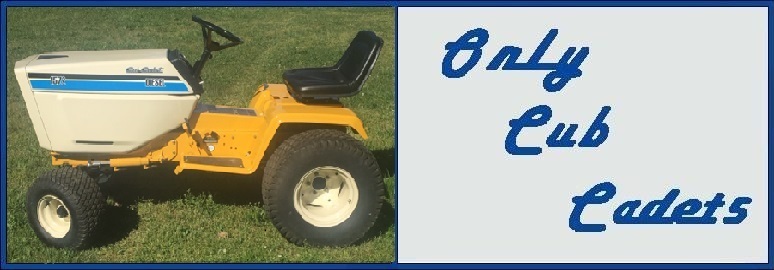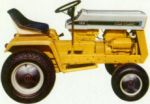
 |
PLEASE PATRONIZE OUR SPONSORS!






|
|||||||
 |
|
|
Thread Tools | Display Modes |
|
#11
|
|||
|
|||
|
It's not clear whether you have a cranking speed problem or an ignition problem.
You may have a coil going bad. Do you have a "good" spark at the plug when it won't start? I've never known slow crank speed on a one cylinder Kohler to be a show stopper but maybe so. |
|
#12
|
||||
|
||||
|
Quote:
I appreciate all the tips and considerations. At this point, I don't believe it to be bad points/timing/coil. I think it just has to do with a poorly topped up battery due to it being out in the windy cold. I'll likely look into the rear end heater for support. As far as the slow cranking speed being an issue, it was like that on my dad's 125 for years. Would it help that it was low on fuel? Did I mention that? I'll keep everyone posted on my findings.
__________________
Daniel G.  . (May 1970) 147 w/an IH spring assist, 48" deck, 42" blade, 1969 73, #2 trailer, 10" Brinly plow and (on loan) Dad's #2 tiller. |
|
#13
|
||||
|
||||
|
Along the same line as Mike McKown was talking about, how well dose your 147 start when the weather is warm?
My first year with the 149 i had similar problems in the winter. It started good in warm weather, but it still cranked a good bit before starting. I checked and adjusted the timing with a timing light and it started so much quicker. I (knock on wood) have never had to jump it again, summer or winter. Just my 
|
|
#14
|
|||
|
|||
|
anyone got picturs of there heaters for a rear end
|
|
#15
|
||||
|
||||
|
Quote:
https://www.youtube.com/watch?v=SyO1ARcU6ac The more I mull it over I wonder if the batt. does not have enough CCA for it when it's cold. Going to try it tomorrow and see what happens.
__________________
Daniel G.  . (May 1970) 147 w/an IH spring assist, 48" deck, 42" blade, 1969 73, #2 trailer, 10" Brinly plow and (on loan) Dad's #2 tiller. |
|
#16
|
||||
|
||||
|
I usually put new plugs in before winter and have recently put some new coils on cubs along with cleaning the points--it has made a difference in my starting. Saturday, I purchased an Interstate Battery with around 375cca (guessinng, because I'm having a senior moment) and it cranks my 782 right up, which is also setting out under a tarp in the wind and cold temps (around 20's and 30's at night and 30's and 40's in the day). A couple of people have already mentioned good grounding, as well, so I'll echo that as well. These tips have been successful for me and I hope they help you, too.
Cub Cadet 123
__________________
Still don't know what I'm doing in OHIO?.....If you find me, then please point me back toward INDIANA. 
|
|
#17
|
||||
|
||||
|
I use this dipstick heater ,works great.Takes about 10 min to heat up the fluid.
__________________
Up to 533 and counting... I give up updating my profile! |
|
#18
|
||||
|
||||
|
An update:
Plugged in a batt. charger/maintainer yesterday, left it on until this afternoon. Outside temps 40 degrees, slight wind. Overnight got down to a low of 26 (at least.) Started up on the second roll over. No problems. Drove it into the garage for some work. Cleaned up all the grounds and connections (over voltage regulator, voltage regulator, under starter/generator, as well as the battery cables and battery with a brass brush. Checked the points- cleaned them with a small file. Took out the plug, checked the gap, re gapped it to .025 per the manual, and cleaned it. Rolled the engine over a few times to check the spark, looked strong from what I could tell. Sat in the garage for about 2 or 3 hours. (unheated garage) while working. After putting it all back together, I tried to start it up. Same result as yesterday. No go. Needed a jump (again) from the truck to get it going. The battery says the cold cranking amps at 32 degrees F is 335. At 0 degrees F is 275. Not sure how old the battery is, but it doesn't look too old. Plans are as follows- New plug Rear end heater. Keep the battery maintainer plugged in. Perhaps? a new battery (but hoping not) with better CCA. Thanks
__________________
Daniel G.  . (May 1970) 147 w/an IH spring assist, 48" deck, 42" blade, 1969 73, #2 trailer, 10" Brinly plow and (on loan) Dad's #2 tiller. |
|
#19
|
|||
|
|||
|
I did som reserch on premium gas and this is what i found out. This equates to any gas engine
via e-mail Not to introduce a radical concept, but have you tried reading your owner's manual? If it says to use premium, my advice is to use premium. If it says regular, use regular. The fact that your note indicates no acquaintance with such matters suggests that you may in fact be a scam victim, assuming by this you mean "someone who believes what he hears in commercials." I have a hard time working up much outrage over this deception, since discovering the facts requires so little effort. If you don't mind paying the extra money for no reason, don't expect the oil companies to suffer any pangs accepting it. In most of the U.S., regular gas has an octane rating of 87, midgrade gas is 89, and premium is 91 or 92. (Octane ratings are lower in the mountain west due to the effects of thin air on internal combustion.) Contrary to widespread belief, the octane rating doesn't indicate how much power the fuel delivers; all grades of gasoline contain roughly the same amount of heat energy. Rather, a higher octane rating means the fuel is less likely to cause your engine to knock or ping. Knock, also known as detonation, occurs when part of the fuel-air mixture in one or more of your car's cylinders ignites spontaneously due to compression, independent of the combustion initiated by the spark plug. (The ideal gas law tells us that a gas heats up when compressed.) Instead of a controlled burn, you get what amounts to an explosion--not a good thing for your engine. To avoid this, high-octane gas is formulated to burn slower than regular, making it less likely to ignite without benefit of spark. The majority of cars are designed to run on regular gas, and that's what the manuals tell the owners to use. Higher-performance cars often require midgrade or premium gas because their engines are designed for higher compression (higher compression = more power), and regular gas may cause knock. If your car needs high-octane gas, the manual will say so. Using high-octane gas in a car designed for regular accomplishes little except more rapid combustion of your money. Some refuse to believe this, claiming, for example, that premium gives the family Toyota better mileage or more power. These people are in dreamland. Others say premium is purer or contains detergents that will cleanse your engine of uncouth deposits. Likewise misguided thinking--government regulations require detergents in all grades of gasoline. (BP Amoco, I notice, asserts that its premium gasoline contains more detergents than legally required; if you think that's worth 20 extra cents a gallon, be my guest.) Some automotive types claim that using premium in a car designed for regular will make the engine dirtier--something about deposits on the back side of the intake valves. I've also heard that slower-burning high-octane gas produces less power when used in ordinary cars. Believe what you like; the point is, don't assume "premium" means "better." Occasionally you get some genius who takes the opposite tack--he spends an extra 10 or 20 grand buying a high-performance car, then decides he's going to save three bucks per tankful using regular instead of premium as specified. He figures as long as the engine doesn't knock he's OK. Wrong, carbon monoxide brain. Car engines nowadays contain knock sensors that detect detonation and automatically retard the spark to compensate. The delay means maximum gas expansion occurs when the piston is farther along in its downstroke and thus there's more room in the cylinder head. This reduces peak cylinder pressure, eliminating knock but also giving you less power and poorer mileage. Brian |
|
#20
|
||||
|
||||
|
That what they taught us, back before Chevy V8's were born.
That high octane burns slower to allow the flame front to progress over the piston area in a controlled fashion, if too fast of a burn occurs and/or multiple flame fronts are produced, a knock occurs when they collide. A lot of owner’s manuals state just what you posted, no need to purchase higher octane than you need. As a side note, I think with today’s economy and most folks buying regular, it is likely that premium has been in their tanks a lot longer than regular. When you start pushing 10- 10.5 to 1 compression, premium becomes necessary, not the low compression engines we use in our cubs. |
 |
|
|
Cub Cadet is a premium line of outdoor power equipment, established in 1961 as part of International Harvester. During the 1960s, IH initiated an entirely new line of lawn and garden equipment aimed at the owners rural homes with large yards and private gardens. There were a wide variety of Cub Cadet branded and after-market attachments available; including mowers, blades, snow blowers, front loaders, plows, carts, etc. Cub Cadet advertising at that time harped on their thorough testing by "boys - acknowledged by many as the world's worst destructive force!". Cub Cadets became known for their dependability and rugged construction.
MTD Products, Inc. of Cleveland, Ohio purchased the Cub Cadet brand from International Harvester in 1981. Cub Cadet was held as a wholly owned subsidiary for many years following this acquisition, which allowed them to operate independently. Recently, MTD has taken a more aggressive role and integrated Cub Cadet into its other lines of power equipment.
This website and forum are not affiliated with or sponsored by MTD Products Inc, which owns the CUB CADET trademarks. It is not an official MTD Products Inc, website, and MTD Products Inc, is not responsible for any of its content. The official MTD Products Inc, website can be found at: http://www.mtdproducts.com. The information and opinions expressed on this website are the responsibility of the website's owner and/or it's members, and do not represent the opinions of MTD Products Inc. IH, INTERNATIONAL HARVESTER are registered trademark of CNH America LLC
All material, images, and graphics from this site are the property of www.onlycubcadets.net. Any unauthorized use, reproductions, or duplications are prohibited unless solely expressed in writing.
Cub Cadet, Cub, Cadet, IH, MTD, Parts, Tractors, Tractor, International Harvester, Lawn, Garden, Lawn Mower, Kohler, garden tractor equipment, lawn garden tractors, antique garden tractors, garden tractor, PTO, parts, online, Original, 70, 71, 72, 73, 76, SO76, 80, 81, 86, 100, 102, 104, 105, 106, 107, 108,109, 122, 123, 124, 125, 126, 127, 128, 129, 147, 149, 169, 182, 282, 382, 482, 580, 582, 582 Special, 680, 682, 782, 782D, 784, 800, 805, 882, 982, 984, 986, 1000, 1015, 1100, 1105, 1110, 1200, 1250, 1282, 1450, 1512, 1604, 1605, 1606, 1610, 1615, 1620, 1650, 1710, 1711, 1712, 1806, 1810, 1811, 1812, 1912, 1914.